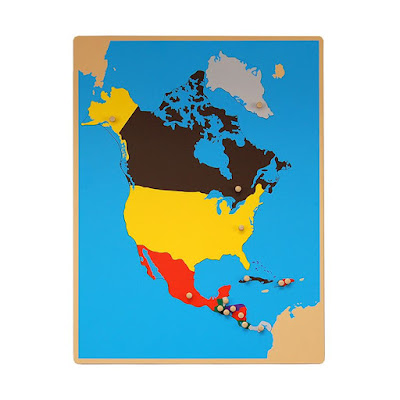When
it comes to teaching young children, parents and educators alike often look for
tools that are both engaging and educational. Among the many options available,
Montessori Puzzle Maps have gained popularity as an excellent resource for
fostering learning in a hands-on, interactive way. These puzzles are designed
to be more than just fun; they offer numerous educational benefits that aid in
the development of essential skills for children.
Kid Advance Montessori Puzzle Maps are more than just typical puzzles; they encourage spatial reasoning, geography knowledge, and motor skills development, all while making the learning process exciting. These puzzles are based on the Montessori method, which is renowned for its child-centered approach to education. In this article, we'll dive into the key benefits of using Montessori Puzzle Maps and why they should be a part of every child's learning toolkit.
What
are Montessori Puzzle Maps?
Montessori
Puzzle Maps are specially designed educational tools that help children explore
the world through geography. These puzzles usually feature maps of continents,
countries, or even individual regions, with pieces that fit together to form
the complete map. The puzzles are often made of high-quality wood, and the
pieces are often shaped to resemble the countries or states they represent,
allowing children to physically interact with the maps.
The
puzzles are designed with colors, shapes, and textures that are appealing to
young children, encouraging them to explore the world of geography. As children
place each piece in its correct location, they develop an understanding of
where different places are located. Some puzzles even include capital cities,
major landmarks, or geographical features like rivers and mountain ranges,
which helps to expand their geographical knowledge.
Key
Benefits of Montessori Puzzle Maps
1.
Promotes Cognitive Development
One of
the most important benefits of Montessori Puzzle Maps is that they promote
cognitive development in children. These puzzles help children understand
spatial relationships and geography concepts, which are essential for building
problem-solving skills. The process of figuring out where each puzzle piece
fits encourages critical thinking and improves memory retention as children
recall locations and their corresponding shapes.
Additionally,
as children work with the puzzle pieces, they develop fine motor skills by
using their hands to fit the pieces together. This combination of cognitive and
physical activity helps children develop a variety of skills that are crucial
for their overall growth.
2.
Enhances Geography Knowledge
Montessori Puzzle Maps are particularly effective in enhancing children’s understanding of geography. Unlike traditional learning methods that often rely on textbooks or lectures, these puzzles allow children to learn in a more interactive and engaging way. By placing each piece on the map, children not only become familiar with the names of countries, states, or continents, but they also learn about the shapes and sizes of different geographical regions.
As
children learn about different parts of the world, they gain a better
understanding of the world’s diversity and develop a deeper appreciation for
various cultures. This geographical knowledge lays the foundation for future
learning and curiosity about the world around them.
3.
Boosts Independence and Self-confidence
The
Montessori method places a strong emphasis on independence. Montessori Puzzle
Maps encourage children to take control of their learning process. As children
engage with these puzzles, they learn to work independently, follow instructions,
and solve problems on their own. Successfully completing a puzzle boosts a
child's confidence and provides a sense of achievement.
These
puzzles also offer opportunities for children to practice patience and
persistence as they work through challenges. The more a child practices, the
more skilled and self-assured they become in their ability to complete the
puzzle and solve other problems.
FAQ
Section
1.
What age group are Montessori Puzzle Maps suitable for?
Montessori
Puzzle Maps are typically designed for children aged 3 and up. However,
depending on the complexity of the puzzle, some puzzles may be better suited
for older children. The puzzles often come in varying difficulty levels, making
them adaptable for different age groups.
2. How
do Montessori Puzzle Maps help with motor skill development?
Montessori
Puzzle Maps are designed to encourage children to use their hands to manipulate
puzzle pieces, which helps develop fine motor skills. As children fit pieces
into the correct slots, they practice hand-eye coordination and dexterity.
3. Can
Montessori Puzzle Maps be used in a classroom setting?
Absolutely!
Montessori Puzzle Maps are ideal for both home and classroom use. In a
classroom, they can be used for group activities, where children can collaborate
and work together to complete the map. Teachers can also use the puzzles as
teaching aids to explain geographical concepts in a hands-on, engaging manner.
4. Are
Montessori Puzzle Maps beneficial for teaching other subjects?
While
Montessori Puzzle Maps are primarily focused on geography, they can also
support other areas of learning. For example, puzzles featuring countries or
continents can serve as a gateway to discussions on history, culture, and
language. By integrating these topics into the learning experience, children
can gain a well-rounded understanding of the world.
5. Are
there eco-friendly options for Montessori Puzzle Maps?
Yes,
many Montessori Puzzle Maps are made from eco-friendly materials like
sustainably sourced wood and non-toxic paints. These options ensure that the
puzzle is safe for children while also being kind to the environment.
Conclusion
Montessori
Puzzle Maps are a fun and interactive way to introduce children to geography
while fostering a range of skills. These puzzles help children develop
cognitive abilities, motor skills, and independence, all while providing an
engaging and educational experience. By incorporating Montessori Puzzle Maps
into a child’s learning routine, you can provide them with a solid foundation
in geography and inspire a lifelong love of learning.
Whether you're a parent looking to support your child’s development or an educator seeking new teaching tools, Montessori Puzzle Maps are a valuable resource that can enrich the learning process in exciting ways. Their ability to teach geography in a hands-on manner makes them a must-have educational tool for young learners.







No comments:
Post a Comment